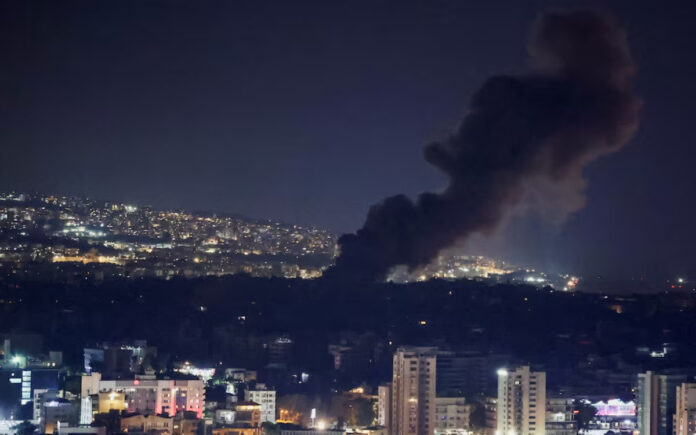Tel Aviv: Israel’s anticipated ground invasion of Lebanon began early Tuesday, with the military announcing that troops had launched “limited” raids targeting Hezbollah positions in the border region. According to a military statement, the operations involved “limited, localized, and targeted ground raids based on precise intelligence” aimed at Hezbollah forces in southern Lebanese villages near the border that posed “an immediate threat to Israeli communities in northern Israel.”
The air force and artillery were providing support with “precise strikes” to assist ground operations. Residents in Aita al-Shaab, a Lebanese border town, reported heavy shelling, while flares illuminated the night sky over Rmeish, another town near the border. Helicopters and drones were heard overhead.
On Monday, Israeli Defense Minister Yoav Gallant informed northern Israeli local council heads that the next phase of operations along Lebanon’s southern border would commence soon. He emphasized that the objective was to safeguard Israelis displaced by Hezbollah rockets during almost a year of cross-border tensions.
This ground invasion marks a further escalation in the ongoing conflict between Israel and Hezbollah, a group backed by Iran. The conflict stems from a broader regional crisis that ignited when Palestinian militant group Hamas launched an attack on Israel on October 7, 2023, a development that risks drawing in both the U.S. and Iran.
In a separate incident, an Israeli strike early Tuesday targeted Mounir Maqdah, commander of the Lebanese branch of the Palestinian Fatah movement’s military wing, the Al-Aqsa Martyrs Brigade, according to Palestinian security officials. Maqdah’s fate remains unclear following the strike on Ain al-Hilweh, Lebanon’s largest Palestinian refugee camp, near Sidon. This was the first reported attack on the camp since cross-border hostilities between Hezbollah and Israel began.
In neighboring Syria, three civilians were killed, and nine others were injured in an Israeli airstrike on Damascus, according to Syrian state media. While Israel did not comment on foreign media reports, it has intensified strikes on Iranian-linked targets in Syria following the October 7 Hamas assault.
Hamas’ October 7 attack resulted in the deaths of 1,200 people and saw around 250 hostages taken, according to Israeli sources. In response, Israel has launched a massive offensive in Gaza, resulting in over 41,300 Palestinian deaths, according to the Gaza health ministry, and leaving much of the territory in ruins.
Also Read | Biden to Maintain 125,000 Refugee Admissions Target for 2025
Airstrikes Hit Beirut as Israel Intensifies Offensive
The ground offensive into Lebanon follows two weeks of airstrikes and the detonation of booby-trapped Hezbollah communication devices. Israel’s assassination of Hezbollah leader Hassan Nasrallah last Friday dealt a significant blow to the group, though it continues to fire rockets deep into Israeli territory.
The Israeli air campaign has also taken a heavy toll on civilians, with Lebanon’s government reporting that approximately 1,000 civilians have been killed and a million people have been displaced. Strikes continued overnight in Beirut’s southern suburbs, a Hezbollah stronghold, with a series of explosions following warnings from the Israeli military for residents to evacuate areas near Hezbollah infrastructure.
Lebanon’s health ministry reported that, in the past 24 hours, at least 95 people were killed and 172 wounded in Israeli strikes on southern Lebanon, the eastern Bekaa Valley, and parts of Beirut.
Also Read | Devastation in North Carolina: Search and Rescue Efforts Intensify After Helene
In his first public speech since Nasrallah’s death, Hezbollah’s deputy leader Naim Qassem declared that the group was prepared for ground engagements. “We know that the battle may be long. We will win as we won in the liberation of 2006,” Qassem said, referring to the last major conflict between Hezbollah and Israel.
Late Monday, Lebanese troops reportedly pulled back five kilometers from positions near the Israeli border, according to a security source. However, the Lebanese army has historically stayed out of direct confrontation with Israel and has not been involved in the current hostilities.
While the U.S. has yet to issue an official response to the ground invasion, President Joe Biden expressed concerns and called for an immediate ceasefire. “We should have a ceasefire now,” Biden said when asked about Israel’s cross-border actions. Last week, Israel rejected a joint U.S.-French proposal for a 21-day ceasefire aimed at facilitating a diplomatic resolution and allowing displaced civilians to return home.



